 Petzlover
Petzlover Bergamasco is originated from Italy but Greek Sheepdog is originated from Greece. Bergamasco may grow 13 cm / 5 inches shorter than Greek Sheepdog. Bergamasco may weigh 12 kg / 26 pounds lesser than Greek Sheepdog. Bergamasco may live 3 years more than Greek Sheepdog. Bergamasco may have more litter size than Greek Sheepdog. Both Bergamasco and Greek Sheepdog requires Moderate Maintenance.
Bergamasco is originated from Italy but Greek Sheepdog is originated from Greece. Bergamasco may grow 13 cm / 5 inches shorter than Greek Sheepdog. Bergamasco may weigh 12 kg / 26 pounds lesser than Greek Sheepdog. Bergamasco may live 3 years more than Greek Sheepdog. Bergamasco may have more litter size than Greek Sheepdog. Both Bergamasco and Greek Sheepdog requires Moderate Maintenance.
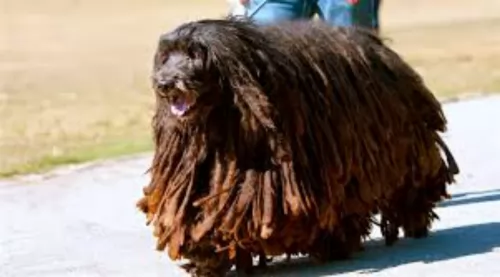 The Bergamasco comes from northern Italy. This medium sized sheepdog is of ancient origin. Known as an Italian sheep herding breed, his name actually comes from the town where he comes from - Bergamo.
The Bergamasco comes from northern Italy. This medium sized sheepdog is of ancient origin. Known as an Italian sheep herding breed, his name actually comes from the town where he comes from - Bergamo.
It was after World War II that there was danger that this breed would disappear as the need for herding and shepherding was diminishing. An Italian breeder, however, Dr. Maria Andreoli, stepped in to save the breed.
It was in 2015 that the American Kennel Club also changed the breed’s status from Miscellaneous to the Herding Group.
 Known as the Olympus Dog or even simply as the Greek Shepherd, the Greek Sheepdog is a large to giant molosser dog from Greece. His purpose has always been to guard flocks and livestock from predators and he has been around for hundreds of years, looking much like the Great Pyrenees.
Known as the Olympus Dog or even simply as the Greek Shepherd, the Greek Sheepdog is a large to giant molosser dog from Greece. His purpose has always been to guard flocks and livestock from predators and he has been around for hundreds of years, looking much like the Great Pyrenees.
It is believed that the dog was likely bred with a number of breeds – both local and non-local dogs.
Unfortunately there were no records kept of the development of the breed but today the Greek Sheepdog remains a rare and fairly unknown breed outside of Greece.
It's numbers are dwindling in Greece too and since 1998 the Greek ARCTUROS has made attempts to save the breed, starting the Greek Shepherd Dog Breeding Program.
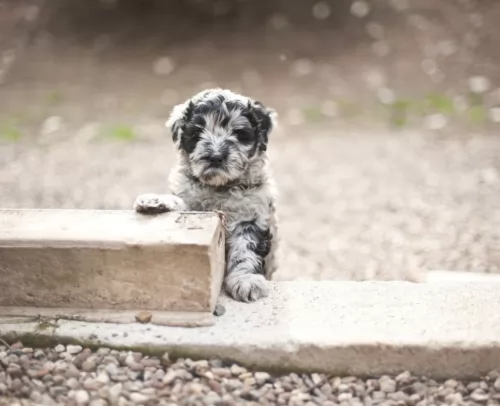 This medium sized sheepdog stands 54 – 62cm in height and weighs up to 38 kg as an adult. It is his coat which draws the most attention. It is of a coarse texture and actually greasy to the touch. It actually forms into strands or almost like dreadlocks from the top of the body, so that people agree he is one of shaggiest dog breeds there are.
This medium sized sheepdog stands 54 – 62cm in height and weighs up to 38 kg as an adult. It is his coat which draws the most attention. It is of a coarse texture and actually greasy to the touch. It actually forms into strands or almost like dreadlocks from the top of the body, so that people agree he is one of shaggiest dog breeds there are.
From age 1 on the coat starts to become woolly, and then the flocks start to form. As these clumps of hair appear, it will become necessary to separate them into smaller cords by hand to ensure attractive formation Brushing isn’t necessary but a big toothed comb can keep their hair ‘groomed’.
The colour of the coat is solid grey with patches of shades of grey and sometimes black. His dense, heavy coat makes it that he is suited to cooler climates. Because he is a herding dog, he wouldn’t do well in an apartment but would suit a home with a large garden.
He is intelligent and social but will need firm handling as he is a boisterous dog. He has a muscular yet compact body with a large head, long tail, high-set semi-drooping ears and large, gentle looking brown eyes. Although not instinctively aggressive, he makes an excellent watch dog with strong protective instincts to protect his human family.
He views new people into his circle with suspicion and wariness. He is good with kids and pets in the home and is playful and energetic.
 The Greek Sheepdog is a large dog, standing at 65 – 75cm and weighing roughly between 32 to 50kg. He is a dog that displays physical strength. He has a large head with brown eyes and a serious expression on his face. He has a thick double coat which is essentially white with red, black or brown markings.
The Greek Sheepdog is a large dog, standing at 65 – 75cm and weighing roughly between 32 to 50kg. He is a dog that displays physical strength. He has a large head with brown eyes and a serious expression on his face. He has a thick double coat which is essentially white with red, black or brown markings.
You will also see tri-color dogs. He has floppy ears today but there was a time when the right ear of the male dog was cut off or cropped. The tail is long and bushy and it can be held low but also held up so that it curls over the back.
Maybe because of his size and him being a strong-willed, independent thinker, the Greek Shepherd may not be the best choice for a first time dog owner. Having said that, if you're a strong, firm, patient, kind person, then you'll be able to raise any kind of dog, first time or not.
The Greek Shepherd is a brave, loyal, calm, protective dog and with socialization and training, can make an awesome pet. They are dogs who are a bit suspicious with strangers, not making friends too easily. He loves his human family and wants to be part of their activities. He can't be left on his own day after day as this can lead to excessive barking and destructive behavior.
They've been dogs used to working with livestock and they will certainly need to be taken on daily walks and involved in rough and tumble games as they thrive on activity. The dog won't fit easily into city life where there is just a handkerchief-sized garden as he needs space and activity.
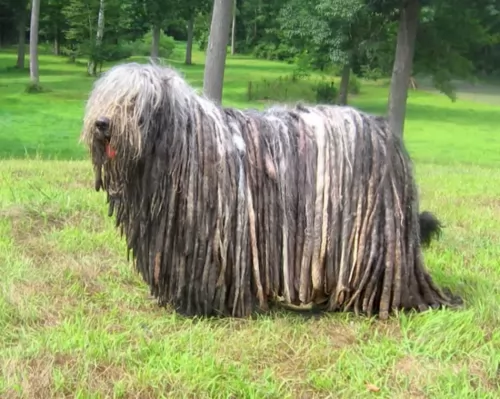 This is a working dog so they are naturally alert. He is also intelligent and independent and this independence is seen with training as he doesn’t take easily to following instructions, becoming stubborn. You’ll certainly want to have your Bergamasco socialized and trained as he can be a boisterous dog, bounding with energy.
This is a working dog so they are naturally alert. He is also intelligent and independent and this independence is seen with training as he doesn’t take easily to following instructions, becoming stubborn. You’ll certainly want to have your Bergamasco socialized and trained as he can be a boisterous dog, bounding with energy.
This is a dog that will need to be kept busy and provided with plenty of activities so that he remains happy, playful and relaxed.
Lively and intelligent, these dogs also form strong bonds with their owners and get on well with the children in the home. He will take well to country life as opposed to living in the city.
 Your Greek Shepherd is an intelligent, independent dog who likes to show his loyalty and devotion to his owner.
Your Greek Shepherd is an intelligent, independent dog who likes to show his loyalty and devotion to his owner.
He is a protective dog too and when trained and socialized makes an excellent family pet. These Molosser type dogs are formidable dogs known for their bravery and courage.
They're the type of dogs who like a strong leader-type of owner and when he gets someone who he can look up to as his leader, he becomes a loyal, devoted pet.
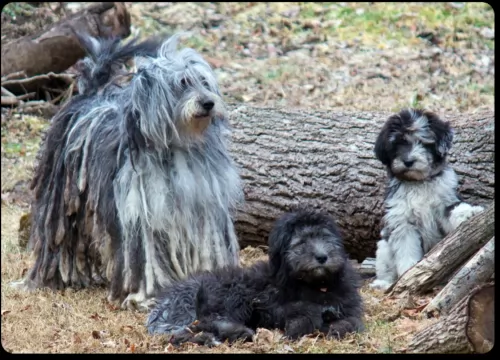 Your Bergamasco can live to be 13 to 15 years of age and he is considered to be a healthy breed. Nonetheless you want to be aware of health issues that are common to this breed
Your Bergamasco can live to be 13 to 15 years of age and he is considered to be a healthy breed. Nonetheless you want to be aware of health issues that are common to this breed
he is vulnerable to heat. He can die of heat exhaustion quicker than other breeds
keep an eye on him for hip dysplasia, progressive retinal atrophy and skin allergies
 With good care and lots of love, this dog can live to be between 10 to 12 years of age. He is unlikely to get sick very often, but still it it wise to know of some of the health issues than can occur with large breed dogs like this.
With good care and lots of love, this dog can live to be between 10 to 12 years of age. He is unlikely to get sick very often, but still it it wise to know of some of the health issues than can occur with large breed dogs like this.
This is a disease of the heart muscle. The heart is enlarged and unable to have the right heart rhythm. The distended muscle isn't able to push the blood through the heart chambers to where it is needed. Cause for this dilated heart can be genetic, nutritional, infectious or metabolic.
Because taurine and carnitine are involved in good heart function, and low levels of these amino acids can cause symptoms of dilated cardiomyopathy, supplementation is useful, especially if you feel your dog isn't getting in the right kind of food.
Borreliosis, a bacterial infection, causes Lyme disease, transmitted by the Ixodes tick. The tick bites the dog and the toxins gets into the dog's bloodstream, with the bacteria travelling to different parts of the body.
Typical symptoms in a dog includes loss of appetite, fever, no energy, swelling of joints and lameness, but symptoms can progress to kidney failure too or cardiac problems. Treatment will include antibiotics.
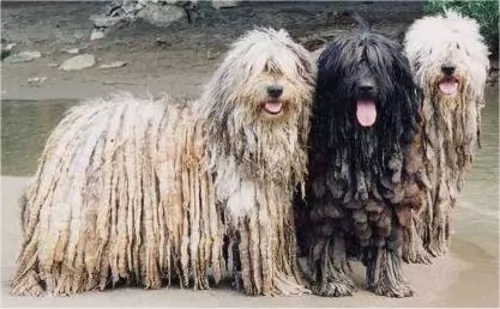 The Bergamasco isn’t a shedder but his coat will need to be combed once a week just to keep it in order. You don’t want to bath him too often, especially during the Winter as his coat takes a long time to dry. It isn’t recommended to shave a Bergamasco as the coat regulates the dogs temperature – keeping him warm and cold as the weather demands.
The Bergamasco isn’t a shedder but his coat will need to be combed once a week just to keep it in order. You don’t want to bath him too often, especially during the Winter as his coat takes a long time to dry. It isn’t recommended to shave a Bergamasco as the coat regulates the dogs temperature – keeping him warm and cold as the weather demands.
They thrive on a blend of kibble (dry) mixed with raw and-or moist food once or twice a day. Remember to include quality chicken, turkey, etc. mixed with some vegetables and rice into your dog’s diet. Ensure a constant supply of fresh water in an easily-cleanable bowl.
Balls and ropes are important for building muscle strength and burning energy. Remember your Bergamasco is a working breed and will need plenty of games and exercise.
 The coat of the Greek Shepherd is fairly long so it will need to be brushed at least twice a week to keep it free from matting and tangling. He is an average shedder and the brushing will remove all loose hairs, keeping the coat sleek and shiny.
The coat of the Greek Shepherd is fairly long so it will need to be brushed at least twice a week to keep it free from matting and tangling. He is an average shedder and the brushing will remove all loose hairs, keeping the coat sleek and shiny.
Feeding your Greek Sheepdog requires giving him top quality food as this will ensure he is healthy and can ward off common dog illnesses. If you're going to be feeding him kibble, make sure to go for the top quality brands, and as a treat for your pet you can add in some brown rice, pasta, brown bread, cooked chicken and vegetables.
Dogs are essentially carnivores and he will need to have some raw meat such as beef added into his kibble from time to time. He should never ever be without a constant supply of fresh, cool water.